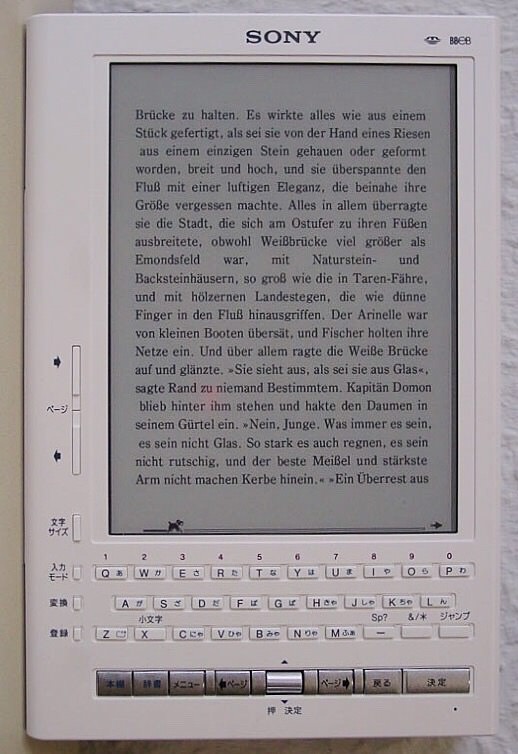Wer bestimmt den E-Book-Preis?

177 Euro und 50 Cent habe ich für meinen japanischen Librie EBR-1000EP vor vielen Jahren auf Ebay einmal gezahlt. E-Books gab es damals quasi nicht. Mittlerweile hat der Amazon Kindle den Kampf ums elektronische Buch gewonnen. Apple versucht über den iBookstore noch das iPads als Lesegerät im Spiel zu halten – als einer der letzten Mitbewerber, der dafür nicht komplett chancenlos scheint. Seit letzter Woche steht nämlich auch fest: Sony klappt seinen E-Book-Reader zu; der ehemals zugehörige Download-Store ist bereits seit Mai in der Hand von Kobo.
Der Sony Reader PRS-T3 markiert damit das Ende einer Ära. Sony zieht sich bis auf weiteres komplett aus dem Endkundengeschäft mit elektronischen Lesegeräten zurück – es sei einfach nicht mehr wirtschaftlich.
Zahlreiche lesenswerte Meinungen hat es zur mittlerweile öffentlich ausgetragenen Auseinandersetzung zwischen Amazon und dem Verleger Hachette ins Netz gespült.
Amazon is not your friend. Neither is any other corporation. It and they do what they do for their own interest and are more than willing to try to make you try believe that what they do for their own benefit is in fact for yours. It’s not. In this particular case, this is not about readers or authors or anyone else but Amazon wanting eBooks capped at $9.99 for its own purposes. It should stop pretending that this is about anything other than that. Readers, authors, and everyone else should stop pretending it’s about anything other than that, too.
I will not sign a letter in support of Hachette. I feel bad for the authors who are suffering financially and I hope they get paid soon, but Hachette’s accusations are manipulative plays to our paranoia, no matter how justified that paranoia might be, because they have exactly zero plans on how to correct all the things they currently think are wrong with the market.
I will not sign a letter in support of Amazon. While as a customer I think they are fabulous and while they have the best deal in town for most self-publishers out there today, that environment is becoming increasingly more dependent on using Amazon and only using Amazon. I’ve seen that market before, and my historical perspective makes me more than suspicious, it makes me alarmed.
Everyone taking sides in this argument is wrong. Every single one of you. You are taking sides for the wrong reasons, supporting the wrong people, endorsing the wrong philosophies, and choosing either path is ultimately bad for everyone.
Und die vielschichtige Diskussion beschränkt sich schon lange nicht mehr nur auf die USA („Wie Amazon Autoren bedrängt“ / „Na, heute schon amazon gebasht?“).
Beim Lesen aller Für und Widers sticht ein (eigentlich) sehr offensichtlicher Aspekt ins Auge: Mit Amazon und Hachette streiten sich zwei Parteien, die lediglich zwischen Autor und Leser stehen. Sie reichern den Entstehungsprozess, der ein Buch zum Leben erweckt, an, vermitteln, bewerben und kurskorrigieren – alles richtig, stehen letztendlich aber nur in der Mitte einer Schreiber-Leser-Beziehung. Und für diese zwei austauschbaren Positionen pokern beide Streithälse nicht nur viel zu hoch, sondern nehmen mit Preisdiktaten und Verkaufsstopps Druckmittel in die Hand, die ihnen nicht zustehen – nicht zustehen dürften.
Das Resultat: a) zu teure und b) nicht erhältliche E-Books. So verkauft sich ganz sicher keine Download-Literatur weshalb Steve Jobs auch aus heutiger Sicht noch richtig liegt als er im Januar 2010 an einen der beteiligten Verleger schrieb1: „Without a way for customers to buy your ebooks, they will steal them. This will be the start of piracy and once started, there will be no stopping it. Trust me, I’ve seen this happen with my own eyes.“